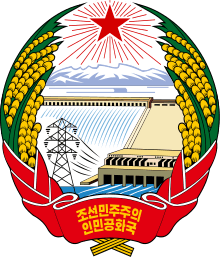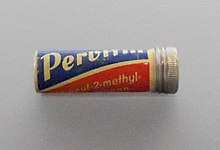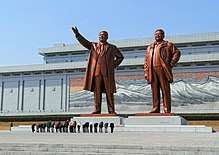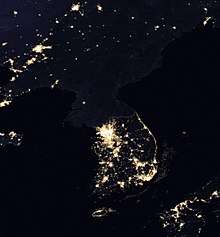

North Korea, also known as the Democratic People's Republic of Korea (DPRK) is a country located in eastern Asia. It is one of the two states, along with South Korea, that were created from the partition of the Korean Peninsula following the defeat of Japan at the hands of the Allied powers in World War II. China and North Korea's attempt in the early 1950s to conquer South Korea by force ended in a stalemate after the United Nations intervened on South Korea's behalf to defend it. Since the collapse of the Soviet Union in the early 1990s, North Korea has been a focus of international concern and regional tension, which increased with its development of nuclear weapons.
Quotes
- (sorted alphabetically by author or publication)
B
- South Korea is an extremely wired country, so has a lot to attack. Unfortunately for the South Koreans, North Korea has extremely limited internet connectivity and hence is a target-poor country. Hence, the only option is [conventional] war - or convincing the North Koreans that they can attack them in cyberspace as well.
- Caroline Baylon, from Chatham House think-tank, quoted on BBC News, "South Korea's strange cyberwar admission" (2 March 2014)
- South Korea has developed into one of Asia's most affluent countries since partition in 1948. The Communist North has slipped into totalitarianism and poverty.
- BBC News, "South Korea country profile: Overview" (8 September 2015)
- North Korea is the only country with which China has a legally binding mutual aid and co-operation treaty, signed in July 1961. There are only seven articles in the document.
The second is the most important: "The contracting parties undertake jointly to adopt all measures to prevent aggression against either of the contracting parties by any state.
"In the event of one of the contracting parties being subjected to the armed attack by any state or several states jointly and thus being involved in a state of war, the other contracting party shall immediately render military and other assistance by all means at its disposal."- Kerry Brown, “How much leverage does China have over North Korea?”, BBC, (5 September 2017)
C
.jpg)
- We stand watch on the DMZ and stand alert against North Korean aggression.
- Ash Carter, interview with Charlie Rose (February 2016)
- Democratic Korea, its leaders and its people will always live in our feelings of revolutionaries, patriots and fighters for the triumph of socialism.
- Citizens are guaranteed freedom of speech, the press, assembly, demonstration and association. The State shall guarantee the conditions for the free activities of democratic political parties and social organizations.
- Constitution of the Democratic People's Republic of Korea (August 2019), Article 67, Chapter V
D
- The cruelest thing you can do is tell a North Korean that many Americans couldn’t locate North Korea on a map.
G
- Trump’s withdrawal from the Iran nuclear agreement, and his tearing up the INF Treaty, has undermined efforts to convince N Korea to give up their nuke program, thus putting us all in grave danger
- Tulsi Gabbard Twitter, (27 February 2019)
- The US must always be willing to meet with our adversaries in pursuit of peace, but our history of regime change war and breaking agreements undermines our credibility. This is why Kim doesn't trust us.
Yesterday’s failure to come to an agreement on NK’s nukes brings me no joy, but rather deep concern. But as I said yesterday on @Hardball, NK will not give up their nukes unless there is a complete re-appraisal of US regime-change “foreign policy.”
- Tulsi Gabbard Twitter, (28 February 2019)
- This isn't a case where the government has turned a blind eye to criminal activities or taking kickbacks from criminals. Experts say the regime itself sanctions and is involved in the criminal enterprises.
"The best way to think about it is kind of like a Sopranos state, like a Mafia state or Mafia country," said Paul Rexton Kan, an associate professor of national security studies at the U.S. Army War College in Carlisle, Pa.
"They sort of nationalized crime and they've industrialized it, and now they sort of weaponized it as well," he said. "It is sort of one whole state that is dedicated to organized criminal activities as a way to fund the regime, fund their programs."- Mark Gollom, “Drugs, counterfeiting: How North Korea survives on proceeds of crime”, CBC News, Dec 07, 2017
H
.jpg)
- In North Korea, every person is property and is owned by a small and mad family with hereditary power. Every minute of every day, as far as regimentation can assure the fact, is spent in absolute subjection and serfdom. The private life has been entirely abolished. One tries to avoid cliché, and I did my best on a visit to this terrifying country in the year 2000, but George Orwell's 1984 was published at about the time that Kim Il-sung set up his system, and it really is as if he got hold of an early copy of the novel and used it as a blueprint.
- Christopher Hitchens, in "Worse Than 1984 : North Korea, slave state", in Slate (2 May 2005)
- The United States and its partners make up in aid for the huge shortfall in North Korea's food production, but there is not a hint of acknowledgement of this by the authorities, who tell their captive subjects that the bags of grain stenciled with the Stars and Stripes are tribute paid by a frightened America to the Dear Leader.
- Christopher Hitchens, "A Nation of Racist Dwarfs" (1 February 2010), Slate.
- Peace and development is the common desire of our times and constitutes the main objective of the United Nations, defining all of its activities. Many countries around the world concentrate their efforts on achieving peace and development, but such efforts are still faced with serious challenges
- The Democratic People’s Republic of Korea and the United States should devote great efforts to building trust as a top priority. The implementation of previous agreements reached in various dialogues and negotiations between the Democratic People’s Republic of Korea and the United States ended in failure because the level of mistrust between them was too high and resulted in a general lack of confidence.
- It is our position that the denuclearization of the Korean peninsula should be achieved alongside the building of a peace regime, on the basis of the principle of simultaneous actions, step by step, starting with what we can do and prioritizing the building of trust. Out of the desire and resolute determination to successfully implement the Joint Statement, the Government of the Democratic People’s Republic of Korea is primarily focusing its efforts on building trust. Even before the Democratic People’s Republic of Korea-United States summit, our Government took significant goodwill measures, such as stopping nuclear and intercontinental ballistic-missile tests, dismantling the nuclear test site in a transparent manner and committing not to transfer nuclear weapons or nuclear technology under any circumstances. We continue to make efforts to build trust.
- However, we do not see any corresponding response from the United States. On the contrary, instead of addressing our concern about the lack of a peace regime on the Korean peninsula, the United States has insisted on denuclearization first and has increased the level of pressure through sanctions in order to achieve its purpose through coercion — even objecting to an end-of-war declaration. The perception that sanctions can bring us to our knees is a pipe dream of people who are ignorant about us. The problem is that the continued sanctions are deepening our mistrust. The reason behind the recent deadlock is that the United States relies on coercive methods that are lethal to trust-building.
I
- “Meth, until recently, has been largely seen inside North Korea as a kind of very powerful energy drug — something like Red Bull, amplified,” said Andrei Lankov, an expert on the North at Kookmin University in Seoul, South Korea, who directs the news site NK News. That misconception, he said, highlighted a “significant underestimation” within the country of the general risks of drug abuse.
Methamphetamine was introduced to the Korean Peninsula during the Japanese colonial period, in the early 20th century, and defectors have reported that the North Korean military provided methamphetamine to its soldiers in the years after World War II. Since the 1970s, many North Korean diplomats have been arrested abroad for drug smuggling. - The Radio Free Asia report could not be independently verified, and the North Korean government has long denied that its citizens use or produce methamphetamine. “The illegal use, trafficking and production of drugs which reduce human being into mental cripples do not exist in the D.P.R.K.,” the North’s state-run news agency said in 2013, referring to the initials of the country’s formal name, the Democratic People’s Republic of Korea.
- Teodora Gyupchanova, a researcher at the Database Center for North Korean Human Rights in Seoul, said that many defectors interviewed by the center in 2016 spoke of crystal meth as a popular gift for birthdays, graduations and “holidays such as the Lunar New Year.”
While meth is illegal in North Korea, like other private economic activities there, the drug has effectively become legal “because officials take bribes to look the other way, and because the state indirectly benefits from a food chain of bribes that goes all the way to the top,” said Justin Hastings, a political scientist at the University of Sydney in Australia who has studied North Korean drug trafficking networks.- Mike Ives, “Crystal Meth Is North Korea’s Trendiest Lunar New Year’s Gift“, Feb. 12, 2019
J
- Unification, as I have mentioned, can be a euphemism for conquest, a gloss for winning the war.... The south's disagreement [against North Korea's proposal for confederation] is in part due to the fact that they believe that the nation and state must be one, that a confederation is not unification, and that North Korea must be totally absorbed into the south, its state destroyed, and its people assimilated.
- Roy Richard Grinker, in Korea and Its Futures: Unification and the Unfinished War (1988), St. Martin's Press
- I only had a vague understanding of what freedom meant when I was back in North Korea... When I thought about freedom or rights, I thought it was a concept that was given under the great leader. Everything was subordinate to the great leader of North Korea.
K
.jpg)
- North Korea abolished the colonial legal system, including civil and commercial laws. However, the country inherited and strengthened a wartime command economy. Regardless of wartime demand or socialist ideology, restriction on or abolition of a market and private property system makes it inevitable that the economy depend on command. In spite of political differences, that is why the two economies seem similar.
On the contrary, however, South Korea returned to a market economy from a wartime command economy, and inherited a legal system and market regime before the Sino-Japanese War. The country regained monetary and tariff autonomy at the price of rapid inflation and retreat from an open economy. Experiences during the wartime command economy have also affected South Korea and caused government interventions in foreign exchange and financial markets. After policy shifts in the 1960s, which made the country’s economy more open and with less government intervention, South Korea was able to head into rapid economic growth.- Kim Nak Nyeon, "Japan’s Colonial Legacy to Korea with Special Reference to Economic Institutions" (2010)
L


- The great famine of 1994-98 was to a large extent the inviolable result of the policies that Kim Il Sung had pursued for decades. The famine was brought about by Kim Il Sung’s fanatical belief in a hyper-centralized, state-managed agriculture, as well as an excessive reliance on (unacknowledged) foreign aid, not to mention militarization run amok. However, if the mine was planted (unintentionally, of course) by Kim Il Sung, it went off under the rule of his son. Hence, most North Koreans blame Kim Jong Il, rather than his father, for the economic disasters of the 1990s.
- Andrei Lankov, "Kim Jong Un’s popularity, explained: Despite purges, third generation of Kim rule maintains approval" (27 September 2015), NK News
- For the average North Korean over the last two decades, the times of Kim Il Sung have often been seen as a lost era of order and stability, in which everyone could be sure that twice a month they would receive food rations sufficient for survival, and essentially free of charge. This was also a time when corruption was kept under control and was largely invisible, material inequality was also almost unnoticeable. Objectively speaking, it was Kim Il Sung’s policies that made the disaster of the 1990s unavoidable. But this had little impact on public perception, and he continues to be held in high esteem by many. Remarkably, such sentiments toward the late Generalissimo are even expressed by refugees – not usually known for their sympathies for the North Korean system and its embodiment, the Kim family. Thus, it is that Kim Il Sung remains venerated, and due to the luck of dying in time, has a remarkably good reputation in death. The opposite is very much the case with his unfortunate son, Kim Jong Il, who inherited power in 1994 and reigned for 17 turbulent years, till 2011.
- Andrei Lankov, "Kim Jong Un's popularity, explained: Despite purges, third generation of Kim rule maintains approval" (27 September 2015), NK News
- North Koreans now understand that South Korea is very rich. It is true, but there is a great difference between vaguely understanding something and having such graphic images of neighbors' prosperity flooding your daily life. As is usually the case, such pictures are liable to be exaggerated at first. An outsider in a rich country usually cannot immediately see the contradictions, problems and tensions that exist behind the sparking, glistening, glitzy facade. For the North Koreans, this picture of the South Korean prosperity would likely be seen as vivid proof of the complete failure of their leadership. The North Korean elite cannot even use the usual trick of putting the blame at the doors of their predecessors: This elite is hereditary, so the buck cannot be easily passed.
- Andrei Lankov, "The Folly of an Inter-Korean Confederation" (October 2015), NK News
- Objectively speaking, the history of North Korean state has been one of an ambitious social if brutal experiment that ended in a very ugly disaster. Essentially, the 70 years of the Kim Family's rule have been the wasted years. The Kim family did not merely build one of the world's most "perfect" Stalinist dictatorships, but also managed to transform into a basket case what once, in the 1940s, was the most advanced industrial economy of East Asia outside Japan. However, one should not expect that such a pessimistic, if honest, view of North Korea's past, is going to be enthusiastically embraced by those North Koreans who bother to care about such matters.
- Andrei Lankov, "Get ready for selective amnesia: Expect northern Koreans to take a Russian or Japanese – not a German – attitude toward the past" (16 November 2015), Post-unification Korea, NK News
- You made us believe, Comrade Kim Jong-il! We cannot live without you. Our country cannot exist without you!
- Lee Jong-oh, "No Motherland Without You" (1993)
- We went over there and fought the war and eventually burned down every town in North Korea anyway, someway or another, and some in South Korea too.
- Curtis LeMay, in Strategic Air Warfare: An Interview with Generals (1988)
M


- North Korea was the Eastern bloc's house cat: intractable, convinced of its superiority, and to some observers a more independent creature, but never much good at feeding itself—even after the can openers started falling silent in 1989.
- Brian Reynolds Myers, "Mother of All Mothers", The Atlantic (September 2004)
- To North Korea, diplomacy is another form of war.
- Brian Reynolds Myers, "Stranger Than Fiction" (13 February 2005), The New York Times
- Koreans in both the north and the south tend to cherish the myth that of all peoples in the world, they are the least inclined to premeditated evil.
- Brian Reynolds Myers, "South Korea's Collective Shrug" (27 May 2010), The New York Times, New York: The New York Times Company
- Korean schoolchildren in North and South learn that Japan invaded their fiercely patriotic country in 1905, spent forty years trying to destroy its language and culture, and withdrew without having made any significant headway. This version of history is just as uncritically accepted by most foreigners who write about Korea. Yet the truth is more complex. For much of the country's long history its northern border was fluid and the national identities of literate Koreans and Chinese mutually indistinguishable. Believing their civilization to have been founded by a Chinese sage in China's image, educated Koreans subscribed to a Confucian worldview that posited their country in a position of permanent subservience to the Middle Kingdom. Even when Korea isolated itself from the mainland in the seventeenth century, it did so in the conviction that it was guarding Chinese tradition better than the Chinese themselves. For all their xenophobia, the Koreans were no nationalists.
- Brian Reynolds Myers, The Cleanest Race (2010), pp. 25–26
- Unlike Soviet citizens under Stalin, or Chinese under Mao, North Koreans learn more about their leaders than from them. It is not in ideological treatises but in the more mass-oriented domestic propaganda that the official worldview is expressed most clearly and unselfconciously. I stress the word domestic. Too many observers wrongly assume that the North Korean Central News Agency's English-language releases reflect the same sort of propaganda that the home audience gets. In fact, there are significant differences. For example, where the DPRK presents itself to the outside world as a misunderstood country seeking integration into the international community, it presents itself to its own citizens as a rogue state that breaks agreements with impunity, dictates conditions to groveling U.N. officials, and keeps its enemies in constant fear of ballistic retribution. Generally speaking the following rule of thumb applies: the less accessible a propaganda outlet is to the rest of the world, the blunter and more belligerent it will be in its expression of the racist orthodoxy.
- Brian Reynolds Myers, The Cleanest Race (2010), pp. 11–12
- The DPRK derives its legitimacy from the myth that the anti-Japanese hero Kim Il Sung was all right-thinking citizens' choice as the man to found and lead the new Korea after liberation in 1945...
- Brian Reynolds Myers, "North Korea's State Loyalty Advantage" (1 December 2011), Journal of International Affairs, New York City: Columbia
- Although North Korea's northern border remains easy to cross, and North Koreans are now well aware of the prosperity enjoyed south of the demilitarized zone, Kim Jong-il continues to rule over a stable and supportive population. Kim enjoys mass support due to his perceived success in strengthening the race and humiliating its enemies. Thanks in part to decades of skillful propaganda, North Koreans generally equate the race with their state, so that ethno-nationalism and state-loyalty are mutually enforcing. In this respect North Korea enjoys an important advantage over its rival, for in the Republic of Korea ethno-nationalism militates against support for a state that is perceived as having betrayed the race. South Koreans' 'good race, bad state' attitude is reflected in widespread sympathy for the people of the north and in ambivalent feelings toward the United States and Japan, which are regarded as friends of the republic but enemies of the race.
- Brian Reynolds Myers, "North Korea's State Loyalty Advantage" (1 December 2011), Journal of International Affairs, New York City: Columbia
- North Korea cannot survive forever on the public perception of state legitimacy alone. The more it loses its economic distinctiveness vis-à-vis the rival state, the more the Kim regime must compensate with triumphs on the military and nuclear fronts. Another act of aggression against the Republic of Korea may well take place in the months ahead, not only to divert North Korean public attention from the failures of the consumer-oriented 'Strong and Prosperous Country' campaign, but also to strengthen the appeasement-minded South Korean opposition in the run-up to the presidential election in 2012.
- Brian Reynolds Myers, "North Korea's State Loyalty Advantage" (1 December 2011), Journal of International Affairs, New York City: Columbia
- North Korea has to inspire its people and so far it's done that.
- North Korea is very much sui generis. It is best seen as being on the cusp between far right and far left. In European political terms I would call it a Strasserite state, after the leader of the Nazis' left wing. Which is to say it is a race-oriented, militaristic state with socialization of assets.
- Brian Reynolds Myers, as quoted in "The Top North Korean Expert Explains What Happened to Kim Jong Un's Uncle" (16 December 2013), by Isaac Chotiner, New Republic
- Its system has been shaped by the need to distinguish itself, to seal itself off from the rival state, and to pursue nuclear armament.
- Brian Reynolds Myers, "North Korea's Unification Drive" (21 December 2017), Sthele Press
N
- As dangerous as a nuclear-armed North Korea is, it pales in comparison to the danger of a nuclear-armed Iran. A nuclear-armed Iran in the Middle East wouldn't be another North Korea. It would be another 50 North Koreas.
- Inspectors document violations; they don't stop them. Inspectors knew when North Korea broke to the bomb, but that didn't stop anything. North Korea turned off the cameras, kicked out the inspectors. Within a few years, it got the bomb. Now, we're warned that within five years North Korea could have an arsenal of 100 nuclear bombs. Like North Korea, Iran, too, has defied international inspectors. It's done that on at least three separate occasions; 2005, 2006, 2010. Like North Korea, Iran broke the locks, shut off the cameras.
- Benjamin Netanyahu, address to U.S. Congress (3 March 2015)
O
- Back in 1994, American negotiators promised a “good deal” with North Korea. Its nuclear plants were supposed to be frozen and dismantled. International inspectors would “carefully monitor” North Korea’s compliance with the agreement and ensure the country’s return to the “community of nations.” The world, we were told, would be a safer place. It wasn’t. North Korea never forfeited its nuclear plants and the inspections proved useless. The community of nations is threatened by North Korean atomic bombs and the world is anything but safe.
- Michael Oren, "Why Israel Won’t Be Celebrating the Iran Deal", Time, (14 July 2015).
S
- Destruction was particularly acute in the North, which was subjected to years of American bombing, including with napalm. Roughly 25 percent of its prewar population was killed, Professor Cumings said, and many of the survivors lived underground by the war’s end.
“North Korea was flattened,” he said. “The North Koreans see the American bombing as a Holocaust, and every child is taught about it.”- Liam Stack, “Korean War, a ‘Forgotten’ Conflict That Shaped the Modern World”, The New York Times, (Jan. 1, 2018)
External links





.jpg)